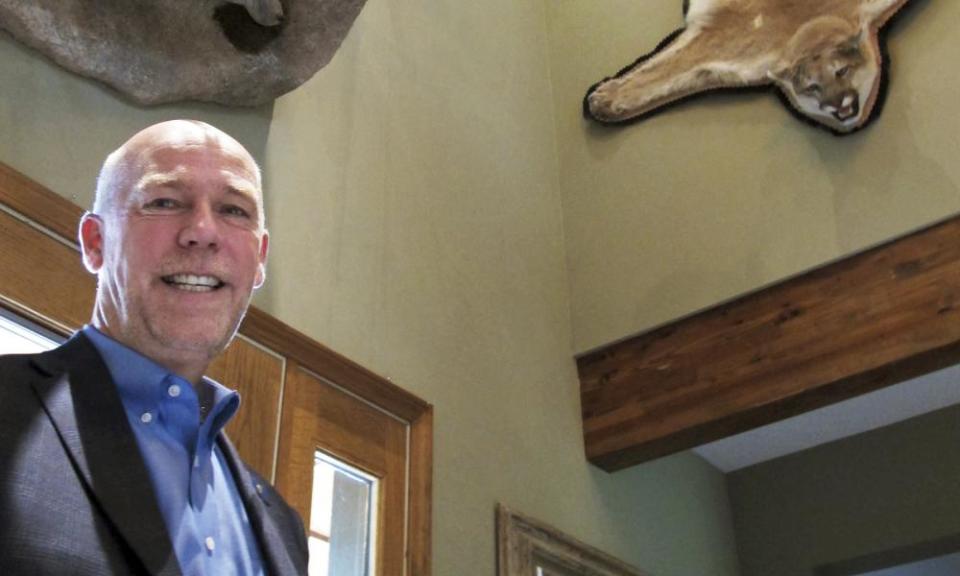GOP candidate Greg Gianforte has financial ties to US-sanctioned Russian companies
Congressional candidate Greg Gianforte owns shares in Russian index funds
Republican candidate body-slams Guardian reporter in Montana
The Guardian is committed to holding power to account. Support our independent journalism by making a contribution or becoming a member

• This story was originally published on 28 April 2017
A Republican congressional candidate has financial ties to a number of Russian companies that have been sanctioned by the US, the Guardian has learned.
Greg Gianforte, who is the GOP standard bearer in the upcoming special election in Montana, owns just under $250,000 in shares in two index funds that are invested in the Russian economy to match its overall performance.
According to a financial disclosure filed with the clerk of the House of Representatives, the Montana tech mogul owns almost $150,000 worth of shares in VanEck Vectors Russia ETF and $92,400 in the IShares MSCF Russia ETF fund. Both are indexed to the Russian equities market and have significant holdings in companies such as Gazprom and Rosneft that came under US sanctions in the aftermath of the Russian invasion of the Crimea.
The holdings, while substantial, make up only a small portion of Gianforte’s wealth. The congressional candidate, who made a fortune starting a software company which was later sold to Oracle, has assets estimated to be worth between $65m and $315m, according to his financial disclosure.
Richard Nephew, the former principal deputy coordinator for sanctions policy at the state department, told the Guardian that “there is definitely a question here but my initial reaction is that this is not something to freak out about”.
He added: “Index funds are usually just like mutual funds, excluded from consideration from a sanctions perspective because the ownership stake per person is incredibly small.”
But he noted that it did raise some concerns from “a Russia policy perspective” as a conflict of interest because “betting on Russia’s economy is problematic”.
Shane Scanlon, a spokesman for Gianforte, told the Guardian that the Republican candidate did not oversee his portfolio on a day-to-day basis. Instead, Gianforte focused on the “overall performance”, he said.
If elected, he said, the Montana Republican would put all his assets in a blind trust to avoid any conflict of interest as well as the fact that Gianforte had released 10 years of tax returns. He added in a statement: “Greg strongly believes his personal assets should never influence his decision-making in office.”
Regarding Gianforte’s views on Russia, Scanlon said: “The situation with Russia is the result of the last eight years of a failed policy by President Obama. The US and our allies need to work together on a long-term strategy to stand against Russian aggression in the region and to ensure the sovereignty of our allies is protected. In any foreign policy decision, we must always ensure that America’s interests are protected.”
But Tina Olechowski, a spokesman for Gianforte’s opponent, Democrat Rob Quist, used the investments to attack the Republican candidate. “Montana voters deserve to know why Greg Gianforte held on to his shady Russian investments after Putin invaded Ukraine, and again when Russia was accused of interfering in the presidential election,” said Olechowski. “Instead Gianforte kept his Russian ties secret during his failed run for governor last year.”
She also emphasized Quist’s strong stance again Russia. “Putin’s Russia invaded Ukraine and interfered in last fall’s presidential election,” said Olechowski. “That kind of aggression is a clear threat to our democracy and global security, and in Congress Rob would evaluate all of our options including whether it makes sense to step up military aid to Ukraine.”
Montana’s special election will be held on 25 May to fill the vacancy created by Republican Ryan Zinke’s resignation to become Donald Trump’s secretary of interior.

